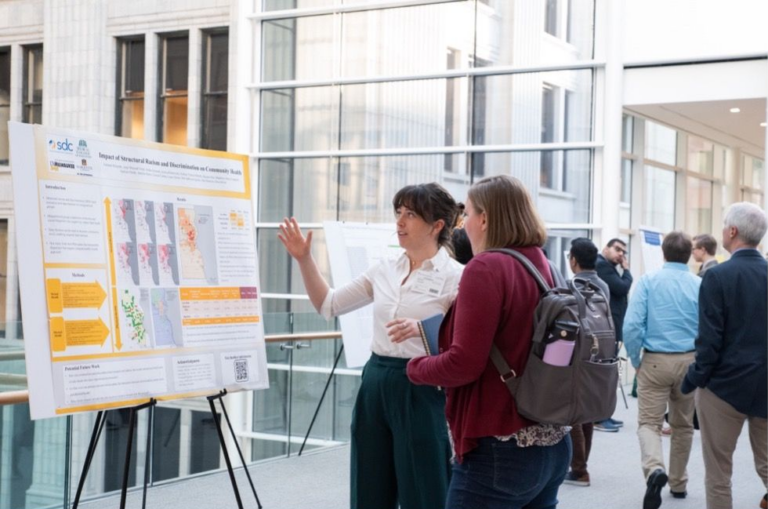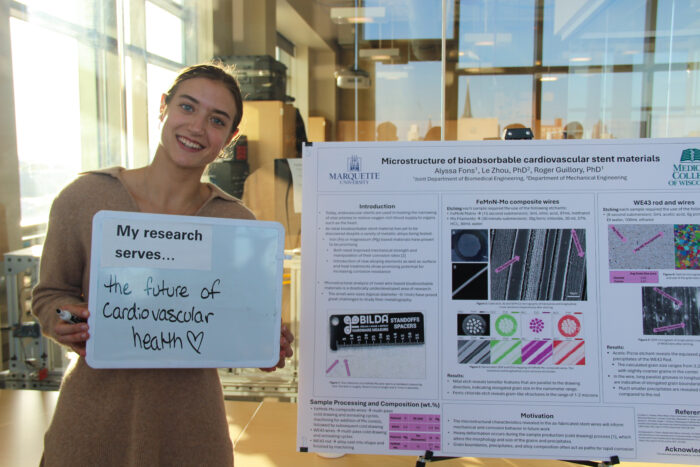This summer, the Northwestern Mutual Data Science Institute awarded nearly $100,000 in funding to 15 Marquette University students and 12 University of Wisconsin-Milwaukee students.
The NMDSI Student Research Scholars Program seeks to engage students from Marquette and UWM in data science research, working with NMDSI-affiliated faculty members and data science experts in cross disciplines to give them hands-on experience in the application of data science. Some of the projects will include working with faculty on sponsored research and others will be in the nonprofit community of Milwaukee.
The selected projects expected to begin this summer span across 13 disciplines, including computer science, physics, art, design and more.
Marquette award recipients
AI Enhanced Peer Support Service for Opioid Use Disorder
- Student Scholar: Sajjad Islam
- Faculty Mentor: Dr. Praveen Madiraju, assistant professor of computer science in the Klingler College of Arts and Sciences
- Abstract: The opioid crisis in the U.S. has strained health care systems. As Opioid Use Disorder (OUD) often coincides with mental health issues, the existing shortage of mental health professionals and societal stigma leaves many individuals untreated, despite the success of peer support services (PSSs) in bridging gaps in care. This project aims to develop and evaluate an AI-based application using OpenAI’s GPT-4 to augment PSSs within the context of OUD. The project involves three phases: data collection and analysis, development of AI prompts, and evaluation.
Determine the Differentially Expressed Genes by Bayesian Decision Rule on RNA-Seq Data
- Student Scholar: Tao Cui
- Faculty Mentor: Dr. Naveen Bansal, professor of mathematical and statistical sciences in the Klingler College of Arts and Sciences
- Abstract: Modern research is increasingly centered around understanding diseases at the genetic level, facilitated by advances in genetic technologies. Researchers utilize RNA sequencing to assess how gene expression is altered in response to disease stimuli by comparing data from control and treatment groups. The traditional approach to identifying genes has significant limitations. A novel methodology based on Bayesian decision theory will be used to address the shortcomings of the traditional method. This method introduces a more complex structural framework for testing, enhancing the robustness of these approaches. The goal of this approach is to utilize correlation information to improve the accuracy of statistical tests and extend these improvements to a broader range of applications in machine learning.
Hypothesis Testing for High Dimensional Problems Application on Age and Cancer Related Circular RNAs
- Student Scholar: Edward Liu
- Faculty Mentor: Dr. Naveen Bansal, professor of mathematical and statistical sciences in the Klingler College of Arts and Sciences
- Abstract: Circular RNAs (circRNAs) are non-coding RNA molecules with stable and specific spatiotemporal expression patterns, making them potential biomarkers for various diseases, including age-related conditions. This project aims to detect and analyze age-related circRNAs, utilizing the extensive data available in CircBase, a dedicated warehouse for circRNA information. Liu’s previous work under Dr. Bansal’s guidance involved a preliminary investigation of age-related circRNAs for his master’s thesis. This new funding will expand this initial research by incorporating additional datasets that include both age-related and cancer-related circRNAs. This extended study will employ the Skewed Adjusted Bayes FDR (SAB_FDR) machine learning tools developed by Dr. Bansal, which are designed to handle the asymmetrical distribution of data typically seen in circRNA expression levels.
Kidney Care: mHealth-based Care for Kidney Diseases Patients Using 10 Second Fingertip Video and Machine Learning
- Student Scholar: Parama Sridevi
- Faculty Mentor: Dr. Sheikh Iqbal Ahamed, professor of computer science in the Klingler College of Arts and Sciences
- Abstract: This project aims to revolutionize the monitoring of kidney conditions, particularly chronic kidney disease (CKD), by introducing a non-invasive and remote monitoring solution using mobile technology and machine learning (ML). Currently, CKD diagnosis relies on invasive blood and urine tests, leading to delayed detection and treatment. Kidney Care proposes using smartphones and near-infrared (NIR) spectroscopy to capture 10-second fingertip videos, from which physiological data related to kidney function can be extracted. This groundbreaking approach eliminates the need for painful and inconvenient tests, offering a pain-free and accessible monitoring solution. The expected outcomes include pain-free, real-time, and noninvasive monitoring of kidney function, empowering CKD patients with remote self-monitoring capabilities, and providing practitioners with evidence-based insights for informed decisionmaking and early intervention.
Robust Classification of Whole Slide Images
- Student Scholar: Saba Heidari Gheshlaghi
- Faculty Mentor: Dr. Nasim Yahyasoltani, assistant professor of computer science in the Klingler College of Arts and Sciences
- Abstract: In cancer diagnostics, doctors rely on detailed digital images of tissue samples to detect and diagnose diseases. Traditional AI systems, known as convolutional neural networks (CNNs), examine these images in small sections. This method can miss crucial details only visible in a complete view of the image, leading to potential misdiagnoses. This project will use the development and deployment of advanced Graph Neural Networks (GNNs) to help overcome the challenges CNNs present. GNNs analyze the entire image in one comprehensive view, ensuring no vital pathological features are overlooked and enhancing the accuracy and reliability of cancer diagnoses across various medical settings. These efforts will help the networks better adapt to different scanners found in different hospitals. By enhancing the tools available for cancer diagnosis with these technologies, this project aims to significantly improve patient outcomes.
Pulsatile: Smartphone Based Oxygen Saturation Detection with Mental and Developmental Health Support EMR for Children
- Student Scholar: Kazi Zawad Arefin
- Faculty Mentor: Dr. Sheikh Iqbal Ahamed, professor of computer science in the Klingler College of Arts and Sciences
- Abstract: This project proposes a novel approach to monitor oxygen saturation and respiration rate using smartphone-based video analysis and photoplethysmography in pediatric populations, particularly those with mental and developmental health conditions like autism spectrum disorder. The proposed system aims to integrate oxygen saturation monitoring with electronic medical record systems, enabling real-time tracking of health parameters and treatment responses. By leveraging noninvasive techniques and AI-driven technologies, this project plans to facilitate remote monitoring, critical patient care in intensive care units, telemedicine integration, and longterm health tracking. Initial pilot studies have shown promising results, and the project seeks to further validate and integrate these technologies into clinical settings to enhance patient care and support health care decisionmaking for children with mental and developmental health needs.
Developing a Storytelling System to Provide Social Support for Perinatal Well Being
- Student Scholar: Farhat Tasnim Progga
- Faculty Mentor: Dr. Sabirat Rubya, assistant professor of computer science in the Klingler College of Arts and Sciences
- Abstract: This research is focused on the potential of online storytelling in providing social support for women experiencing perinatal mental health (PMH) issues, particularly perinatal depression. Through a user-centered approach, the research aims to bridge the gap in PMH intervention by developing and evaluating a “storyteller” technology to enhance social support for mothers during this critical phase. This multidisciplinary approach holds promise for advancing inclusive and effective perinatal depression interventions, emphasizing the importance of leveraging digital platforms to provide accessible and empathetic support for women navigating the challenges of the postpartum period.
Generative AI-based Noninvasive Hemoglobin Level Prediction from Fingertip Video
- Student Scholar: Nafi Us Sabbir Sabith
- Faculty Mentor: Dr. Sheikh Iqbal Ahamed, professor of computer science in the Klingler College of Arts and Sciences
- Abstract: Hemoglobin is one of the most significant hematological parameters of the human body as it bears valuable diagnostic information on potential diseases. Anemia, a common blood disorder, is characterized by a severe reduction in hemoglobin levels. Advancements in technology have brought several hemoglobin level measurement techniques to the fold and thus prompted a growing need for enhanced prediction accuracy to address the looming needs of a substantial part of the global population. This project will include an exploratory multi-model comparative study using six different machine learning regression models to estimate blood hemoglobin levels and leverage the power of generative AI to create synthetic data and augment it with the actual dataset of real patients to improve the performance of models.
Chest Disease Classification from X-ray Images using Zero-Shot Learning
- Student Scholar: Sifat Md Belal Uddin
- Faculty Mentor: Dr. Nasim Yahysoltani, assistant professor of computer science in the Klingler College of Arts and Sciences
- Abstract: The rapid advancement of deep learning has significantly enhanced medical imaging diagnostics capabilities. However, the effectiveness of these models largely depends on the availability of large, accurately annotated datasets. This project proposes a novel solution to these challenges by implementing zero-shot learning (ZSL) techniques for the classification of chest diseases from X-ray images. ZSL enables the classification of disease classes that are not present in the training dataset and overcomes the limitations of conventional supervised learning models. The research methodology uses graph-based techniques to enhance the learning process. This project significantly impacts health care by enhancing diagnostic accuracy, especially in low-resource areas where the labels of data are scarce. Expected outcomes from this project include a ZSL model for accurate chest disease classification and publications in leading journals.
A More Representative Approach to Simulating Complex Valued fMRI Data
- Student Scholar: John Bodenschatz
- Faculty Mentor: Dr. Daniel Rowe, professor of mathematical and statistical sciences in the Klingler College of Arts and Sciences
- Abstract: In the realm of neuroimaging research, the demand for efficient and accurate simulation tools for functional magnetic resonance imaging (fMRI) data is ever increasing. This project aims to develop a standardized software tool for simulating complex-valued fMRI time series data and advance understanding and implementation of the MR signal equation and related physics principles to create a comprehensive simulation package. The core objective of the project is to provide researchers with a user-friendly MATLAB graphical user interface tool capable of generating complex valued fMRI time series data. This tool will allow researchers to input various parameters related to the MRI scan and receive simulated k-space data, facilitating a deeper understanding of the intricacies of fMRI data generation and interpretation.
Modeling Longitudinal Multiomics Data Using Hybrid Principal Component Analysis
- Student Scholar: Soroush Mahmoudiandehkordi
- Faculty Mentor: Dr. Mehdi Maadooliat, associate professor of mathematical and statistical sciences in the Klingler College of Arts and Sciences
- Abstract: This research aims to tackle the intricacies of longitudinal multiomics data, particularly focusing on integrating functional principal component analysis (FPCA) and regularized multivariate FPCA (ReMFPCA) methodologies. By leveraging the power of hybrid PCA, this project seeks to unravel the complex interplay between temporal activity patterns and genetic factors inherent in genomic studies, particularly in the context of disease progression analysis. The project hinges on refining and extending existing PCA frameworks to accommodate the unique challenges posed by multiomics data, such as RNA sequencing, RT-PCR, and laser capture microdissection (LCM) data. Overall, this project represents a pivotal step towards unraveling the intricate tapestry of genomic data, leveraging the synergistic fusion of statistical modeling, computational analysis, and domain expertise to drive impactful discoveries in the field of biomedicine.
Machine Learning in Regulatory Technology (RegTech): An Approach to Build an Anti-Money Laundering Detection Model
- Student Scholar: Samuel Brooks
- Faculty Mentor: Dr. Badar AI Lawati, assistant professor of practice of management in the College of Business Administration
- Abstract: Regulatory technology is a field that has seen a massive boom since the use of machine learning algorithms has been widely adopted. This project aims to build an anti-money laundering (AML) detection model based on transaction data and predict the likelihood of a fraudulent transaction. The burden of detecting and reporting fraudulent transactions falls onto financial institutions, and approaches to detection tend to vary. Currently, a rules-based transaction monitoring approach is the standard within the industry, however, this approach leads to a 95% false positive rate, which is draining on firm’s resources. This study aims to build an AML detection model leveraging machine learning algorithms to more accurately flag fraud.
Correlated Parallel Partial Emulation for Geophysical Applications
- Student Scholar: Joseph Lyon
- Faculty Mentor: Dr. Elaine Spiller, associate professor of mathematical and statistical sciences in the Klingler College of Arts and Sciences
- Abstract: This project aims to advance data science methodologies for forecasting volcanic flow inundation from potential future eruptions of the Fuego Volcano in Guatemala. Leveraging the VolcFlow simulator, which models pyroclastic density currents, this project will apply a novel approach called “correlated parallel partial emulation” (PPE) to enable a rapid probabilistic hazard analysis. The project’s innovative aspect lies in its integration of data science methodologies, specifically implementing a sparsified and computationally efficient version of the correlated PPE into the field of geophysical modeling. This research not only contributes to the understanding of volcanic hazards but also showcases the integration of data science methodologies in geophysical research, highlighting the interdisciplinary nature of the project and its significance in advancing both fields.
Regularized Multivariate Functional Principal Component Analysis
- Student Scholar: Yue Zhao
- Faculty Mentor: Dr. Mehdi Maadooliat, associate professor of mathematical and statistical sciences in the Klingler College of Arts and Sciences
- Abstract: This project focuses on advancing the field of data science through the development of a novel methodology called “regularized multivariate functional principal component analysis” (ReMFPCA), which aims to enhance interpretability by introducing regularization techniques, including sparsity penalties, to identify meaningful patterns in multivariate functional data. This project will involve a deep dive into statistical and computational methods, including functional singular value decomposition, smoothing penalties, and sparse penalties. Additionally, the project will involve extensive computational work, providing hands-on experience with data analysis tools and programming languages commonly used in data science.
Graph Explainability for Optimal Placement of Phasor Measurement Units in Distribution Grid
- Student Scholar: Dibaloke Chanda
- Faculty Mentor: Dr. Nasim Yahyasotani, assistant professor of computer science in the Klingler College of Arts and Sciences
- Abstract: Phasor measurement units (PMUs) are data acquisition devices used in modern distribution grids to collect grid information. PMUs capture vital information about electrical quantities, including voltage, current, and phase angle, with high precision and reliability. In addition, PMUs enable real-time monitoring and control of power systems, which allows for monitoring dynamic changes in the grid. The goal of this project is to use different graph explainability methods to identify the most important nodes in a power distribution system for optimal placement of PMUs for the timely detection of fault events. This work aims to use a graph neural network explainability approach to identify optimal placement locations in the distribution grid. By leveraging explainability methods, it can be determined which specific node information contributed most to the prediction of fault events.
Visit nmdsi.org to read the full article.



